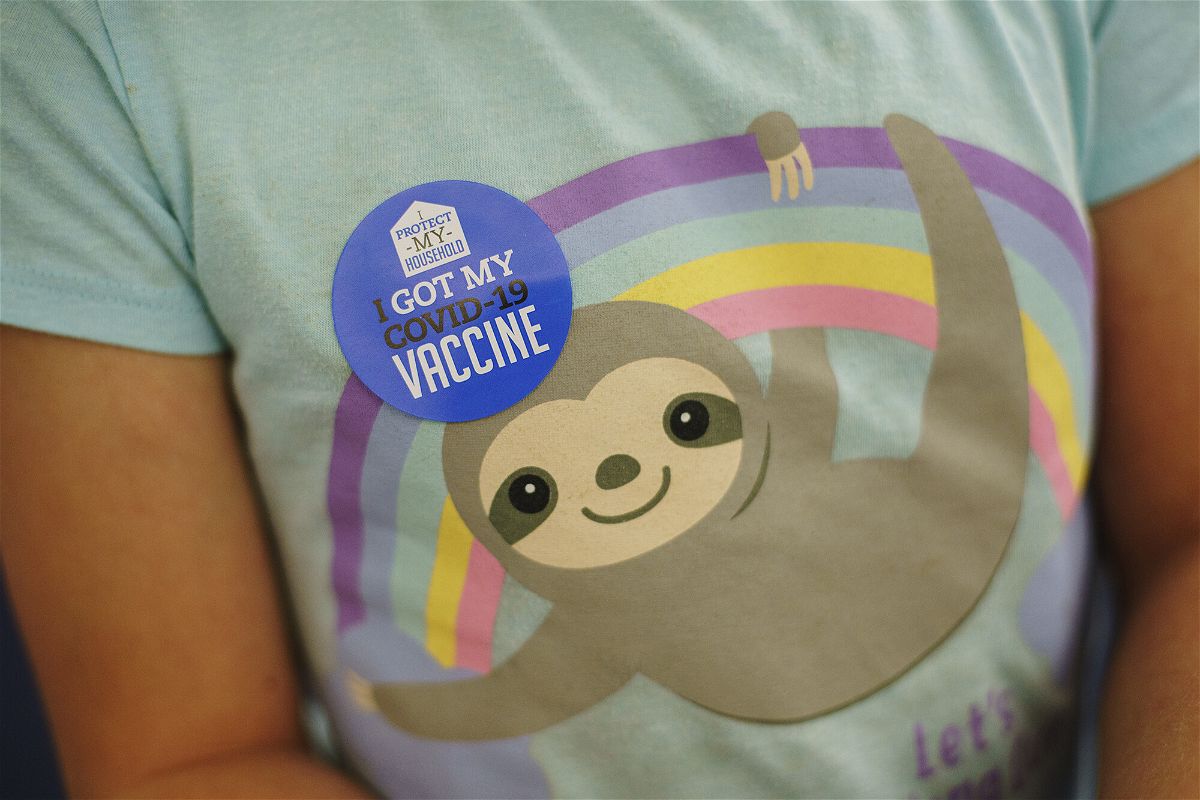Answering kids’ (and parents’) questions about the Covid-19 vaccine for ages 5 to 11

Being upbeat about all the benefits of the vacciine will help your child
By Sandee LaMotte, CNN
It was a big day for Sesame Street’s 5-year-old Rosita, who recently got her first dose of the Covid-19 vaccine.
“My mommy and my papi said that it will help keep me, my friends, my neighbors, my abuela all healthy,” Rosita tells CNN Chief Medical Correspondent Dr. Sanjay Gupta on the sixth town hall co-hosted by CNN and Sesame Street’s Big Bird and friends.
“Your parents are absolutely right,” Gupta tells Rosita. “Covid vaccines are now available for children 5 years and older and the more people who get them, the better we’re going to be able to help stop the spread of Covid and keep everyone healthy.”
Join Gupta, CNN anchor Erica Hill and the Sesame Street gang Saturday at 8:30 a.m. ET on CNN, CNN International and CNN Go, to see “The ABCs of Covid Vaccines.” The half-hour town hall is part of Sesame Workshop’s Caring for Each Other initiative. Funded by the nonprofit’s Critical Needs Response Fund, the initiative provides free resources for parents and families during the Covid-19 pandemic.
What do kids of that age really want to know?
Will it hurt?
Ouch. “By far the No. 1 thing that I hear is, ‘I don’t want this to hurt. How bad is it going to hurt?'” pediatrician and child development expert Dr. David Hill told CNN last month.
“I never lie to kids. I never tell them it’s not going to hurt at all or you’re not going to feel it, because it’s just not true,” said Hill, who is a co-host on the American Academy of Pediatrics’ flagship podcast, “Pediatrics on Call.”
Parents are bound to hear this question before they get into the car to go get the vaccine, and Hill has some ready advice:
“You want to be honest. You want to say, ‘You know what, it’s going to hurt just a little bit, but it’s not going to hurt as bad as some other things that happen to you all the time — like falling down when you’re running or stubbing your toe.'”
Can you keep it from hurting?
Being told it will hurt — even just a bit — might still be alarming for some kids, especially those who are hesitant about needles. There are things parents (and health care practitioners) can do just before and during the shot that can help, Hill said.
Give the child a sense of control. Talk with the child about what they can do, such as deciding where they would like to receive the shot.
“You like to play baseball and you’re right-handed, right? Maybe you want to have the shot in your left arm instead of your right,” Hill said.
Kelly Foy and Pat McLarney, who are both child life education specialists at Connecticut Children’s Medical Center, told CNN in a prior interview that younger children might benefit from advance role-playing, by administering vaccines to stuffed animals or dolls before their shot. Older children might write a list of questions for the nurse and doctor, they said.
Use distraction and calming techniques. Hill suggests talking to children in advance about how they can use breathing and distraction techniques to reduce their focus on the shot.
He suggests asking your child: “‘Do you know that if you take a breath and blow out really slowly things hurt less? They also hurt less if you’re singing or if you’re holding my hand.’
“If you can reassure children that yes, you’re going to have control, and yes, it’s going to hurt a little, but we’re going to help you keep it from hurting as much as you think, those things can be very helpful,” Hill said.
A child could also hold some ice to their arm to numb it just before the shot, Foy and McLarney suggested. (Buy an instant cold-pack to use or check with your pediatrician in advance to see if they can refrigerate one.)
Pop-it toys, fidget spinners, bubble wrap, squeeze balls, even vibrating toys can also be great distractions, they said. Older children may benefit from creating a playlist of songs to listen to, playing a video game, or cuing up a distracting video to watch.
Play a fun activity to do after. Kids get excited about family outings, visits to their favorite places and play dates, experts say. So plan something fun they can look forward to.
Positive attitudes are key
Getting vaccinated is a positive thing, and parents should emphasize the benefits, experts stress, such as more play dates with friends and seeing relatives or family friends who have been off limits due to age or immune status.
“Get together, masks off, give grandparents or whoever a hug … you get everyone vaccinated and that’s exactly the scenario that can sort of play out,” Gupta told CNN anchor John Berman on CNN’s New Day this week.
“The data has been really compelling. We knew how good the vaccines were from the initial data: They reduce the likelihood of infection 11.5 times and reduce the likelihood of getting severely ill 20 times. They’re not perfect. They’re really, really good,” Gupta said.
As far as kids are concerned, this is just one more shot just like all the others they get, Hill stressed.
“How they react is going to be very largely — if not completely — dependent on how the adults in their lives frame the experience,” he said.
“If we are expressing concern, skepticism or worry, they’re absolutely going to pick up on that. If we’re expressing confidence and relief, they’re going to pick up on that as well. And children are always listening, even when we think they aren’t,” he added.
Mixing Covid-19 and flu vaccine
Many parents want to know if they can get their child immunized from the flu at the same time they are receiving the Covid-19 vaccine.
“The answer is yes,” Gupta told Berman. In fact, he said, pediatricians often encourage getting multiple vaccines on the same day.
“It’s easier that way — you don’t have to keep bringing the child back,” Gupta said. “They’ll have a sore arm for a couple of days, but get both shots. It may be a worst flu season this year.”
If given at the same time, the vaccines would be given in a different injection site — for example, in the other arm, or in two different places on the leg, CNN Medical Analyst Dr. Leana Wen told CNN this week.
Wen stressed that even healthy children need to get the Covid-19 vaccine as soon as possible.
“About one-third of the children who have been hospitalized from Covid-19 are those with no underlying health conditions. Healthy children can become very sick from coronavirus,” she said.
Side effects
Speaking of sore arms, what other side effects should parents look for from the Covid-19 vaccine?
The vaccine trials done on thousands of kids age 5 to 11 show very similar side effects to those in adults, but were often milder, said Wen, who is the author of a new book, “Lifelines: A Doctor’s Journey in the Fight for Public Health,” and the mother of two young kids.
“The most common side effects are soreness at the injection site, fatigue and headache,” Wen said. “Some children can experience fever and chills. All of these side effects subside within a couple of days. In fact, the risks of these side effects were lower in the younger kids than in adults — probably because of the lower dose.”
The authorized dosage for ages 5 to 11 is 10 micrograms, or one-third the 30 microgram dose given to adults and kids age 12 and older.
“Some parents may be worried about long-term side effects,” Wen added. “There is no scientific reason to think that this would happen. Side effects from other immunizations occur within the first two or three weeks following the shots, not months afterward.”
One safety concern has been the risk of myocarditis, an inflammation of the heart muscle, and pericarditis, the inflammation around the heart, which has appeared occasionally in younger adults who received the vaccine.
The clinical trials on ages 5 to 11 were careful to track any responses that might be warning signs and saw no cases of myocarditis in the children’s trial, said Dr. Emanuel “Chip” Walter Jr., chief medical officer of the Duke Human Vaccine Institute and professor of pediatrics at the Duke School of Medicine in Durham, North Carolina, who led one of the trials.
“If a child complained of any pain, chest pain, or shortness of breath, families were immediately called and children were evaluated. So it was examined quite closely in the trial, and there were no cases,” Walter told CNN in late October.
Can children with food allergies get vaccinated?
There’s no reason to avoid the Covid-19 vaccine if your child has a common food allergy, Wen stressed.
“The Covid-19 vaccines do not contain egg products, as some other vaccines do. If your child has a food allergy or had a reaction to another vaccine in the past, that is not a reason to refrain from the Covid-19 vaccine,” she said.
However, do check with your doctor if your child has had a prior reaction to a vaccine or injectable therapy for another disease, the US Centers for Disease Control and Prevention advised.
“Your doctor will help you decide if it is safe for you to get vaccinated,” the CDC wrote.
Overall, the only reason not to get this vaccine, according to the CDC, is if the child has a severe allergic reaction to one of its components — PEG or polysorbate.
“PEG is an ingredient in the mRNA vaccines (Pfizer-BioNTech and Moderna), and polysorbate is an ingredient in the J&J/Janssen vaccine,” the CDC states.
When is my child fully vaccinated?
Just like with adults, a child is considered fully vaccinated two weeks after the second injection. At this point, there is no way for children to be fully vaccinated by Thanksgiving or Hanukkah, experts say. Therefore all precautions, including masking and social distancing from high-risk family members, should be followed.
As long as the first shot is administered by November 19, a child will have full protection for Christmas, Kwanzaa and end-of-year gatherings.
The-CNN-Wire
™ & © 2021 Cable News Network, Inc., a WarnerMedia Company. All rights reserved.
CNN’s Madeline Holcombe, Katie Hurley and Faye Chiu contributed to this story.

